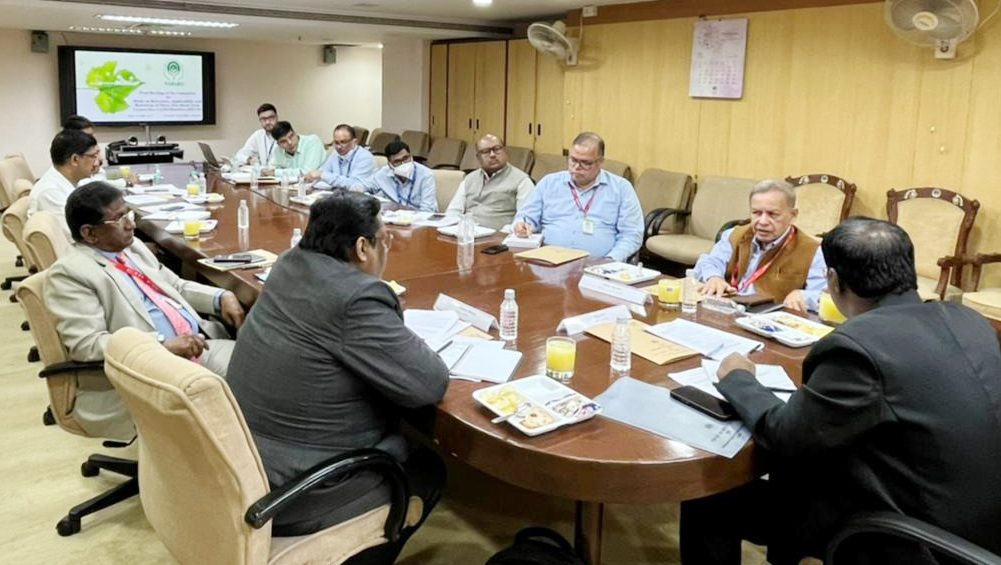The First meeting of the Expert Committee constituted by the Ministry of Cooperation to conduct a Study on “Relevance, applicability and retention of three-tier Short Term Cooperative Credit Structures (STCS)” was held on Monday at the NABARD’s headquarters in Mumbai.
It was held under the chairmanship of Nabard Deputy Managing Director Shaji K V, in which RBI Central Board Director Satish Marathe, NCCT Secretary Mohan Mishra, Nafscob Managing Director Bhima Subrahmanyam were also present as its members.
The meeting lasted for more than two hours and participants deliberated on the relevance of a three-tier short term cooperative credit structure with respect to the Indian Cooperative Movement.
Talking to the Indian Cooperative, one of the participants said, “It was the first meeting after the constitution of the expert committee by the Ministry of cooperation. We have decided to draft a questionnaire which will be sent to the state cooperative banks, district central cooperative banks and a few PACCs to take their response on the three-tier structure”.
“Besides, the decision for holding a conference of representatives of apex banks, DCCBs in more than five places across India was taken in the meeting. It was one of the meetings in which the discussion was held on the applicability of three-tier Short term Cooperative Credit Structure in the country”, he underlined.
Soon after the meeting the members of the expert committee paid a courtesy call to Nabard Chairman G R Chintala.
It is worth mentioning that for the past many years, Sahakar Bharati has been raising a voice against the abolition of three tier structure but with the creation of a new ministry of cooperation, this has gained momentum and as a result an expert committee on this has been formed.


Meanwhile, there are few states like Kerala, Nagaland, Assam and others that have adopted the two-tier structure i.e. PACCs are directly accountable to the apex banks but in the case of Kerala Bank, we have seen that the formula of two tier structure has failed to take shape, said a cooperator.
The states like Punjab, Andhra Pradesh, Uttar Pradesh, Uttarakhand are moving forward to adopt a two tier structure but so far the proposal is lying in the corridors of respective state secretariats.
The newly constituted expert committee has been asked to submit the study report within three months.














































Now three tier system losing their relevance due to more information technology adopted by all apex and ccb.you can manage it by technology, on other side ur rates of interest will minimize to ultimate poor farmers last but not least other unnecessary expenditures on heavy boards management which role is only in employees would sorted out
What’s the role of DCC BANKS if implemented
2 tier structure?
When commercial banks and RRBs are already merged and a few more in process, how cooperatives compete with these unitary tier banks. Whether the margins will b sufficient, with low level of CASA deposites, it is difficult for the three tiered coop banks. Already many DCCBs are in difficulties. Bail outs, how long!. Bail outs will not work unless and until some radical structural changes are made. One of them would be merger of DCCBs with Apex banks
Sir pls do something for PACS Staff pls Transfer the PACS Secretaries one PACS to another PACS.
Poor farmers and workers were utterly cheated due to system of mismanagement. They had been wandering in thousands of indian streets for their burning demands. It is the time to expediate restructure of co operative banks from three tier to two tier systems, so as enable us pumbing money to deserved people very easily at low interest rate.
What is about dccbs which are financially strong collecting deposits giving good service to public depositors may not have confidence on state banks
Iam working in one of the pacs in karnataka.. According to me the ultimate farmer needs pacs and not dccb…. Dccb are just cheating pacs and getting their bread and food forcefully by the pacs…. They act very badly with pacs staffs….. And so the dcc is just of no use in middle…. And in pacs presently their is no proper control and software from govt so the pacs are just indulging in malpractice…. Kindly bring a control by govt and also make a transfer system for employees….. So these type of criminal activities will be controlled ……
The merger of the DCCBs and APEX Bank is inevitable as there is no scope for DCCBs to compete with service area commercial and private banks.
DCCBs can’t survive unless there is equal technology adoption and professionlaism in services offered.
Two tire structure will definitely help if implemented with well defined policy frame work and necessary changes in the structure.
There may some instances where the two tire structure has failed, but in larger interest and also in view of upcoming banking technology advancements there is no other option than merger of dccbs and apex Banks.
I hope Nabard and RBI will make a stand on this sooner.
In case of Haryana PACS are having huge imbalances & there Accumulated losses are of very high magnitudes. At present PACS are not in the ambit of licencing normes as Banking Regulation Act ( AACS ) is not applicable on PACS .. In case of delaying what will be the fate of Haryana State Coop Bank as Acumulated losses of PACS will add Losses of State Coop. Bank adversely affecting licencing norms of bank
Cooperatives are becoming political hub. So please merge dccbs with apex bank.
The change from three tier to two tier in short term agricultural credit is irrelevant in the light of the emergence of Kerala Bank in our experience.. The all 13 District Cooperative Banks represent 13 different economy.The General Manager of district cooperative banks were M. B. A. holders and they were given targets by the board and they including allthe staff were bound to achieve the targets. The timely decision andimplementation was much faster as compared to that of the Kerala Bank.The leadership of cooperative movement in the districts were done by the DCBs and circle cooperative unions and cooperative department officers.Majority of all expenses of all the public programs were met by the concerned District Cooperative Bank.Now it has come to an end.. As all the District Cooperative Bank.have supervisory powers and inspection over affiliated societies especially over PACS it was a major fear and weapon to prevent the affiliated societies from misappropriations and frauds.The department has la major set back as it lost 13 major district level societies having an average working capital of 3000 crore.. The Kerala Bank is an utter failure in terms all activities like Deposits, Loans Outstanding, Overdue, CRAR, HR, Competitive products, Supervision and Control, timely dicision and implementation.So in practice three tier is relevant.